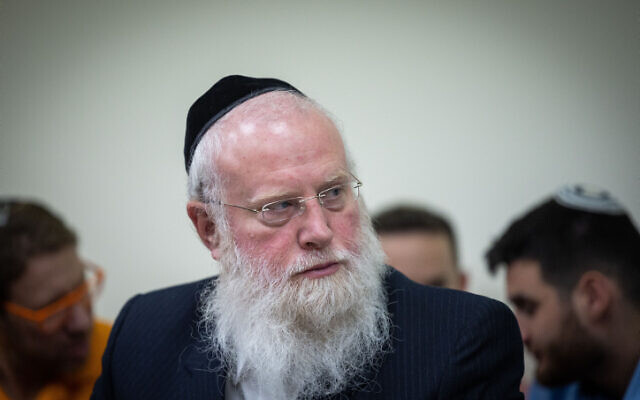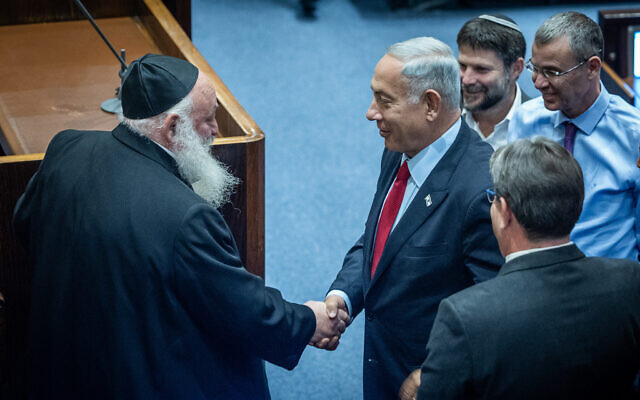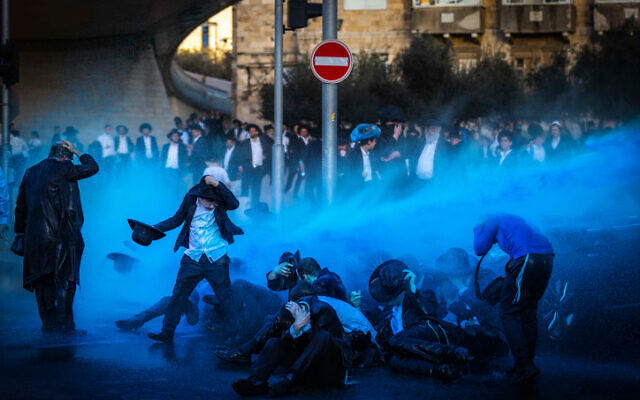Some of the ultra-Orthodox coalition parties sharpened their rhetoric on Tuesday against Prime Minister Benjamin Netanyahu over the lack of progress in passing a law to exempt the ultra-Orthodox military service, with a minister saying that if Netanyahu does not keep his promises He should step down if he can, and a legislator warning his faction cannot support the state budget would automatically end the coalition.
United Torah Judaism (UTJ) MK Moshe Roth told The Times of Israel that the chief rabbi of Agudath Israel, the Hasidic faction within the party, was dismayed by the failure to pass the law so far, noting that the alliance between the UTJ and Likud The compromise includes an explicit pledge to approve such legislation before the budget is passed.
Although the government has a majority of 64 MKs in the 120-member Knesset and Agudath Yisrael has only three Knesset members, four MKs from Degel Hatorah, the party’s non-Hasidic faction, may join their allies, posing a serious threat. Is. The government which has until 29 May to pass a budget to prevent the Knesset from automatically dissolving, with national elections.
The right-wing, religious coalition is seeking to pass legislation that would lower the age after which men would be exempt from military service from 26 to 21 years.
The current age of exemption prevented yeshiva students from entering the workforce until after age 26, even if they were not interested in continuing their religious studies.
The security establishment opposes such a drastic drop in age and analysts predict the sides will have to meet somewhere in the middle.
Roth said that the issue of military conscription was important to the rabbinic leadership of Agudat Yisrael.

United Torah Judaism MK Moshe Roth attends a party faction meeting in the Knesset on Nov. 21, 2022. (Jonathan Sindel/Flash90)
Roth said, “The leaders of Agudat Israel are hopeful that the agreement will be kept.” “We are angered and disappointed by [the military service exemption laws] Not done yet as we expect the agreements to be put in place.
Roth, the Agudath Israel representative of the Sanz Hasidic community, acknowledged that it is now impossible to pass such a complex law within three weeks before the budget deadline on May 29, but said his party would urge Netanyahu and the government to take concrete measures. Expects the issue is for them to vote for the budget.
He said such measures would require the submission of a draft bill on the issue, which has not yet been drawn up, as well as a statement on the timetable for the final passage of the law.
“We certainly hope [Netanyahu’s] likud [party] To make any progress in this matter. If this happens then the budget will deteriorate. If no progress is made, Agudat Israel will not vote with the government, which means the government could fall,” Roth said.
The coalition agreement between the UTJ and Likud stipulates that a basic law be passed before the budget is passed, including Torah study as “a fundamental value in the heritage of the Jewish people”, as well as Ultra’s There is also a law allowing blanket exemption from IDF service for Orthodox yeshiva student.

Likud party chairman Benjamin Netanyahu shaking hands with United Torah Judaism party leader Yitzhak Goldkopf at the Knesset plenum on November 21, 2022. (Jonathan Sindel/Flash90)
The Basic Law demand on Torah study is designed to prevent the High Court from striking down the broad exemption law, as it has done on three occasions in the past, on the grounds that such an exemption is based on equality for all citizens. violates the principle. , as all other Jewish men are forced to do military service.
Meanwhile, Jerusalem Affairs Minister Meir Porush laid the blame for the failure to fully pass these laws at the door of Netanyahu.
“Why did we sign alliance agreements? Wouldn’t they be? Porush said in an interview with the Haredi news site Keiker Hashabbat. “I didn’t get Netanyahu. How ridiculous does he want to look?
The ultra-Orthodox minister pointed to his party’s demand for a so-called override clause, allowing the Knesset to re-enact legislation struck down by the High Court of Justice, or something from the High Court’s review from the outset. Bills saved.
Porush described his party’s demand for an override clause as a “full-on” override, only in an explicit reference to the 61MK requirement to be able to activate the override, and explained that UTJ’s spiritual The leaders would not agree to sign. on an alliance deal without such a pledge.
The override clause, part of the government’s deeply controversial judicial overhaul plan, is seen by ultra-Orthodox parties as a further requirement to ensure that military service exemptions become a permanent fixture of Israeli law. Critics say it will undermine Israel’s democratic foundations by handing the government unchecked powers.

Ultra-Orthodox men clash with police in Jerusalem during a protest against the arrest of community members who failed to comply with their army draft on September 29, 2022. (Olivier Fitoussi/Flash90)
“Why did I bother helping build this coalition, only to hear the same excuses from Treasury officials we got [Naftali] Bennett-[Yair] Lapid Age? Why did we bother holding elections?” he said, referring to the previous government and adding that the current finance ministry has continued its pressure on Haredi demands for additional funding for ultra-Orthodox yeshivas.
“When will we stop being afraid [of complying with laws regarding mandatory service], And if we have to be afraid, Netanyahu should say he can’t be prime minister because ‘I can’t give you what you need’ — he should say that,” Porush said.
“Netanyahu can’t say ‘I can’t.’ You can’t? Then don’t be prime minister. What is this? Go home,” he whispered.
Degel Hatora is believed to be more pragmatic on the timetable for passing the military service exemption laws, although a spokesman for the faction’s chairman, MK Moshe Gafni, said the party is not currently commenting on the issue.
Likud is seeking to delay passage of the law, fearing additional public pushback if it acts to pass the unpopular legislation after losing key support on how to proceed with the judicial overhaul, which it has now has been paused to allow for ongoing settlement talks. Oppose.

Finance Committee head MK Moshe Gafni and Finance Minister Bezalel Smotrich during a hearing on the state budget at the Knesset Finance Committee on April 16, 2023. (Yonatan Sindel/Flash90)
More importantly, Netanyahu’s party fears it will not have time to pass the budget by the end of the month if it adds more items to the agenda.
Speaking about the principle of Haredi military service exemption, Roth argued that Torah study was a fundamental element in preserving religious observance and ultimately in the justification of the Jewish people’s right to live in the Land of Israel.
Roth said, “We the Jewish people have our crown jewel and that is the Torah, which has been with us for 3,500 years.”
“Without the Torah, there is no Israel. And why did we return to this ancient land called the Land of Israel? Who gave us, under which law this land is ours? It all comes back to the Torah … The only right we have over the Land of Israel is because of our Torah,” he continued.
Roth claimed that the Israel Defense Forces had no immediate need for additional manpower, and accused opponents of blanket exemptions for ultra-Orthodox yeshiva students, such as opposition leader Lapid and Yisrael Beiteinu party leader Avigdor Lieberman, as principled rather than principled. Motivated by political expediency. Concern for IDF requirements.
People use this issue to gain political power. Politicians are not against the law for practical reasons or philosophical reasons or even defense reasons. The only reason to oppose it is because people like Lapid and Lieberman use the issue to gain political mileage,” Roth claimed.

Ultra-Orthodox Jewish men study at the Lithuanian Slabodka yeshiva in the ultra-Orthodox city of Bnei Brak, July 8, 2013. (Yaakov Naumi/Flash90)
When asked why the ultra-Orthodox community could not emulate the combined Torah study and military service model used by the religious Jewish community, Roth argued that the latter did not produce Torah scholars of sufficient quality.
“How many Torah scholars have come out of yeshivas that hesitate, and how many have come from yeshivas that do not combine Torah study and army service? There is no comparison between the two systems,” argued the legislator.
When asked whether all ultra-Orthodox yeshiva students become great Torah scholars, Roth acknowledges that some students may eventually be more suited to other endeavors, but stresses that “those between the ages of 17 and 22 The middle years would have to be devoted entirely to Torah study,” and that only after that age should the question of whether or not to remain in the yeshiva be considered.